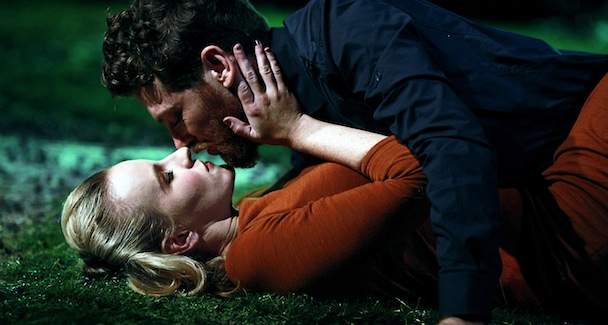Macbeth – Bell Shakespeare
The witches, the ghosts, the murders, the coups, that wonderful, powerful, punished, sleepwalking Lady — this play is thrilling every time.
Overview
Will we ever tire of Macbeth? The witches, the ghosts, the murders, the coups, that wonderful, powerful, punished, sleepwalking Lady — it's thrilling every time it's restaged and reinvented. In Bell Shakespeare's fourth time around (following productions in 1994, 1997 and 2007), they've relished bringing out the gloom, mud, palpable fog, old magick and feeling of fate that so evoke a Scottish tragedy.
It is on a sloped, grass-riven stage, forebodingly reflected in the black ceiling that converges down upon it, that Macbeth (Dan Spielman) and his friend Banquo (Gareth Reeves) are given the prophecy that plants the seeds of ambition in Macbeth. When he returns to his castle and his lady (Kate Mulvaney) with the news, she gives him the final push onto the bloody, megalomanic path that will make him king, realise their grandest dreams and rip the two apart with its consequences.
Mulvaney is one of the most exciting contemporary stars of Australian stage, and once again she does a phenomenal job as both actor and dramaturg. With director Peter Evans, she has skinned this Macbeth down to a pacey, roaring thriller. She's said she found the key to the Macbeths' seemingly extreme motivations in their mourning for a recently lost child ("I have given suck, and know how tender 'tis to love the babe that milks me," she says, while steeling Macbeth for murder), and the result is an impressive chemistry and tenderness in the two's performances. They really convey what we would, in the modern parlance, call unhealthy co-dependency.
There's some great, fun decisions made throughout the show, including stylised movement creating dynamism between scenes and the convergence of the play's famous three witches into one (an appropriately spellbinding Lizzie Schedesta), in the throes of possession. Schedesta's exceptionally controlled movement and sympathetic presence elevate the role. There's actually a shift that comes with making her character beautiful and esoteric; she's no longer a cruel hag, and it suddenly feels like a sin how Macbeth has acted upon her gifts.
Macbeth peaks right before interval, with a lively and poetic dinner party scene at which Macbeth is haunted by the spirit of Banquo, whom he doublecrossed to secure his hold on the crown, while Lady Macbeth plays down his "fit" and tragedy begins to build. It doesn't have the persuasive vision of Evans' last work with the company, Julius Caesar, but this is a powerful Macbeth that should drag you into its fateful marsh.





